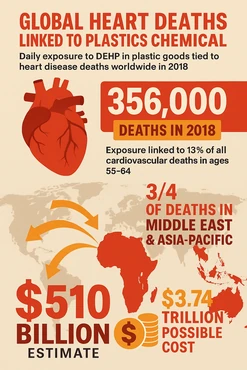A new study links the plastic chemical DEHP to 356,000 heart disease deaths globally in 2018, urging urgent regulations for public health.
April 29, 2025
Key takeaways
- DEHP, a plastic-softening chemical, may have contributed to 356,000 global heart disease deaths in 2018
- NYU researchers identify Asia and the Middle East as bearing three-quarters of the health burden
- Study calls for global regulation as plastic exposure poses rising public health risks
A new global study has linked a common plastic additive to more than 356,000 deaths from heart disease in 2018, spotlighting the severe health risks associated with everyday exposure to phthalates, chemicals used in a wide range of consumer products.
The analysis, published April 29 in Lancet eBiomedicine, was conducted by researchers at NYU Langone Health, who found that exposure to di-2-ethylhexyl phthalate (DEHP)a chemical used to make plastics soft and flexiblewas likely a major contributor to heart-related deaths, especially among adults aged 55 to 64.
A widespread danger

DEHP is found in food containers, medical equipment, cosmetics, detergents, and other common items. As the compound breaks down, it releases microscopic particles that can be ingested or absorbed by the body. Past research has linked phthalates to obesity, diabetes, infertility, and cancer. Now, this latest study estimates that DEHP alone was responsible for 13% of all cardiovascular deaths in the specified age group in 2018.
This adds to the vast body of evidence that these chemicals present a tremendous danger to human health, said lead author Sara Hyman, associate research scientist at NYU Grossman School of Medicine.
The economic burden from these deaths is equally staggering estimated to total $510 billion globally, and potentially reaching as high as $3.74 trillion, according to the researchers.
Asia and the Middle East hit hardest
The analysis showed a geographic imbalance in the health effects, with Middle East, South Asia, East Asia, and the Pacific accounting for roughly three-quarters of the death toll. India alone saw more than 103,000 deaths, followed by China and Indonesia. Researchers adjusted their models to account for population differences and still found significantly higher death rates in these regions.
One potential reason: these areas are undergoing rapid industrialization and increased plastic production, often with fewer regulatory safeguards than in Western countries.
There is a clear disparity in which parts of the world bear the brunt of heightened heart risks from phthalates, said senior author Dr. Leonardo Trasande, professor of pediatrics and environmental health at NYU Grossman.
A call for global action
The researchers emphasized that the study does not prove causation, but rather a strong association between DEHP exposure and heart disease deaths. The findings were based on chemical exposure data from over 200 countries, collected via population surveys and urine samples, along with mortality data from the Institute for Health Metrics and Evaluation.
Trasande said future work will look at how reductions in phthalate exposure affect global health outcomes and plans to expand research into preterm birth and other conditions linked to these chemicals.
The team urges urgent global regulatory action to reduce exposure to DEHP and similar phthalates especially in countries experiencing plastic booms with limited oversight. While some phthalates are already banned or restricted in the U.S. and Europe, enforcement varies widely worldwide.
We need to treat this as a global public health emergency, Trasande said. Reducing exposure to toxic plastics is no longer optional its essential.
Newsletter
Sign up below for The Daily Consumer, our newsletter on the latest consumer news, including recalls, scams, lawsuits and more.
.newsletter-form {
display: flex;
max-width: 400px;
margin: 20px auto;
background: #f8f9fa;
padding: 10px;
border-radius: 8px;
box-shadow: 0 4px 6px rgba(0, 0, 0, 0.1);
}
.newsletter-input {
flex: 1;
padding: 10px;
border: 1px solid #ccc;
border-radius: 5px 0 0 5px;
font-size: 16px;
outline: none;
}
.newsletter-input:focus {
border-color: #007bff;
}
.newsletter-button {
background: #2976D1;
color: white;
border: none;
padding: 10px 15px;
font-size: 16px;
border-radius: 0 5px 5px 0;
cursor: pointer;
transition: background 0.3s ease;
}
.newsletter-button:hover {
background: #0056b3;
}
#Plastics #chemical #linked #heart #disease #deaths #worldwide